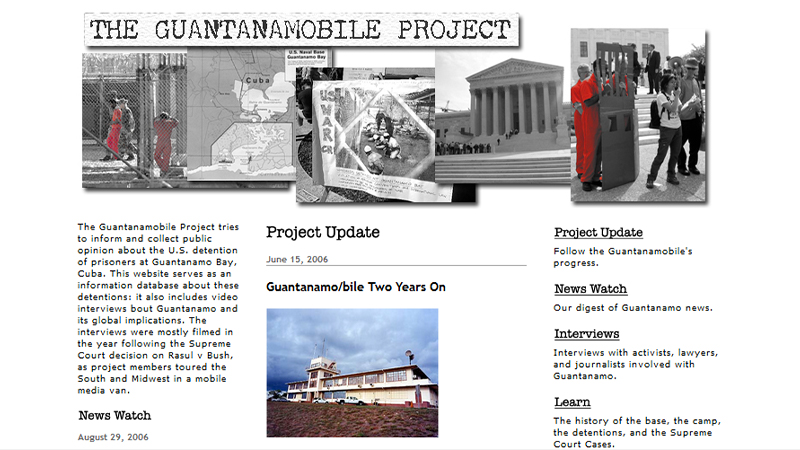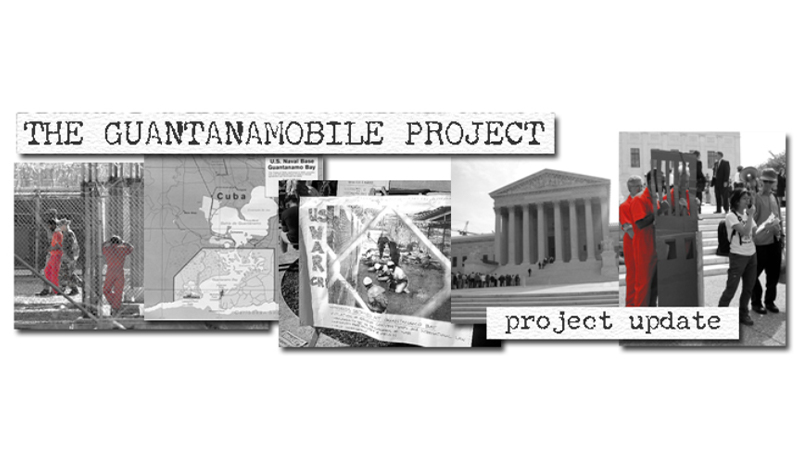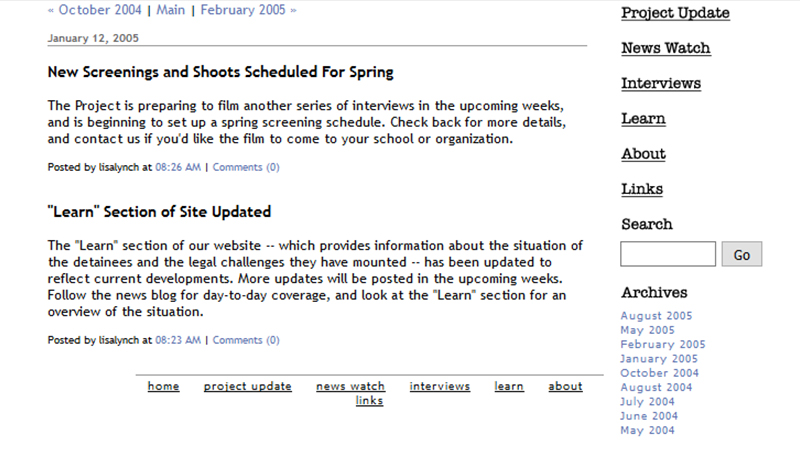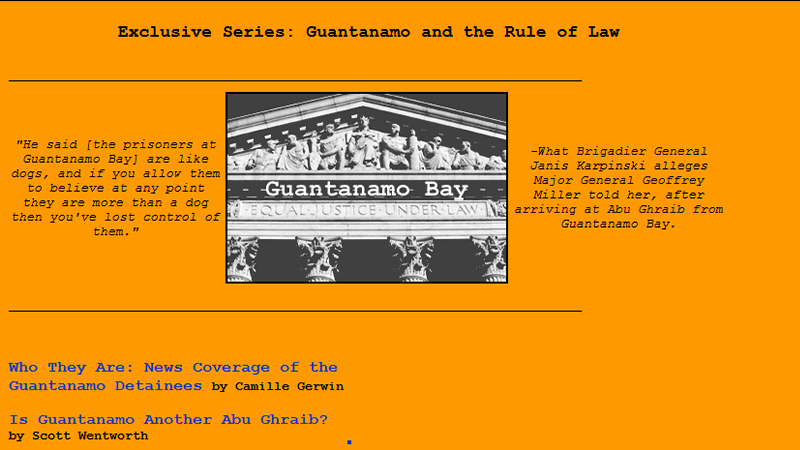The Guantanamobile Project is a project that took "a shrink-wrapped, tech-laden van into the streets and parking lots of several Southern and Midwestern cities. The van created a mobile, roaming public sphere aimed at engaging reflection and dialogue about U.S. detention practices at Guantanamo. The Project was motivated by its creators' observation that U.S. citizens seemed largely unconcerned with what was happening on a remote military base beyond the borders of the nation, so it also provided factual and analytical information about the U.S. legal system and the detention center itself. The results of their experiments with this technologically-mediated, D.Y.I. public realm form one thread of the Vectors' project presented here.
This publication brings together material from the road trip and its interviews, from extensive research, from the film produced for the road trip, and from the website for the larger project, underscoring the mutability and transformative potential of digital documents. Working across multiple platforms – both digital and physical – and drawing from an ever-expanding database of resource materials to create civically-engaged products, The Guantanamobile Project underscores the intermedial quality of 21st-century life. The use of audio and video in the piece published here sets the stage for the user's deeper engagement with a host of moral, legal, and political topics. It also reminds us that mobility is not equally available to everyone.
Like others pieces in this issue, The Guantanamobile Project also blurs the line between 'scholarship proper' and public discourse, encouraging an expansion of the scholarly concerns of legal and cultural studies to a broader audience. Given the circulation possibilities of digital publication and the increasing marginalization of the humanities within the university, it is crucial to understand such public sphere activity as scholarly activity rather than as something scholars might do 'in addition' to their research. Such a perspective informs the ongoing push within the academy toward a new type of public humanities that can connect the work of various scholars to issues of public relevance and import." – Vectors Journal Editorial Staff
Author's Statement
"Our contribution to the Mobility issue of Vectors, The Guantanamobile Project, is both an interactive document of a topical event — the detention of terror suspects at the U.S. military base in Guantanamo Bay, Cuba — and a consideration of the what we might call the 'uneven mobility' of different kinds of citizens in today's globally interconnected world. Our interviews with lawyers, activists, and family members of the detainees draw attention to the legal and physical immobility of the detainees, some confined at Guantanamo since late 2001. And a second set of interviews conducted during the summer of 2004 with Americans in the Midwest and South demonstrate the difficulty of 'mobilizing' U.S. citizens to become concerned about the situation in Guantanamo, since concern for the detainees required expanding often fixed notions of justice and human rights across the boundaries of nationality, race, and religion.
To collect the material for this article, we also had to take advantage of our own relative mobility as U.S.-based academics with (admittedly limited) institutional resources at our disposal, including the support of a Vectors fellowship. Thus, this site is both an extension and a final installment of a larger activist project. In March of 2004, the two of us—a media studies scholar and a historian interested in public scholarship — began to organize a multimedia project about the detention of terror suspects in Guantanamo Bay. Our project grew from an initial news website to a documentary project to a road trip to a film tour; now, we add this piece of online scholarship to our efforts.
When we began, the detainees at Guantanamo Bay were of little interest to most Americans—and, for the most part, of little interest to the American media. We wanted to do two things: to try to get as much information about Guantanamo out to as many people as possible, and to try to get a sense of what people really knew or thought about the idea of holding suspected members of the Taliban or Al Qaeda on a base that the Bush Administration claimed was outside of the jurisdiction of U.S. Courts. With that in mind, we launched a website with information about the project and a news blog. At the same time, we began to plan a road trip through the South and Midwest that would allow us to interview people outside of the Northeast about what they knew about Guantanamo. Somewhere along the way, we decided that we should have something to show these people, so we fitted out a van with an inverter and a rear projection screen and started making a short film about the detainees. When we went on the road in late July 2004, we had a volunteer crew of 75 people, and had filmed in Germany, England, and around the United States. As we traveled, we interviewed by day and screened by night. Over the course of the past year, we continued working on the film, incorporating the road interviews, and also traveled to universities around the Northeast talking about Guantanamo and the past, present, and future of wartime detention. We also began to focus more closely on the story of Murat Kurnaz, a German-Turkish detainee whose detention and legal proceedings are highlighted in the site we have developed here.
By the time we sat down to work on this site for Vectors — about 18 months after the project began — the situation at Guantanamo had, in many ways, changed dramatically. A July 2004 Supreme Court decision had granted detainees the right to file habeas claims in Federal Court, denying the government its [assertion] that Guantanamo was somehow outside of the law. The abuse scandal at Abu Ghraib in April 2004 raised concerns about possible abuse in Guantanamo; those fears subsided, and then were reaffirmed by an ACLU FOIA case that produced FBI correspondence about detainee abuse. Reports that the Koran was mistreated at the base caused riots. The New England Journal of Medicine claimed that doctors were violating their professional ethics by aiding investigations. Senate hearings were held in which both Democrats and Republicans were critical of practices at the base, particularly the idea of indefinite detention. And, in the beginning of August, the Pentagon announced that it would try to send most of the detainees to prisons in their home countries.
In the face of all of this rapid change, however, it is important to remember that for many of the detainees, things have changed little or not at all. This is certainly true for Murat Kurnaz, the detainee whose story we have tried to tell on this site. According to his lawyer, Kurnaz is a man for whom time stopped in late 2001 — who had no idea, before he was told, that the U.S. had gone to war with Iraq, and who has corresponded only briefly with his family and not at all with his fiancée over the past three-and-one-half years of his detention. Kurnaz's case belies rosy interpretations of the social and political advantages of twenty-first-century mobility.
The Guantánamobile Project records and analyzes opinions by participants, experts, and lay Americans while the situation in Guantánamo Base is still undecided. We thus organized our site around interlinked interview clips to convey the provisional state of these debates. At the outset, an audio collage compiles contradictory and conflicting statements our interviewees made about the issue. The main part of the site consists of twelve arguments, organized by topics related to Guantánamo detentions, including Place, Due Process, Torture, Justice, Security, and Media. Each argument is accompanied by a sequence of three interview excerpts in dialogue with each other and with quotes and other evidence we selected to complement or contradict the interviews. Each of the video sequences works as a self-contained unit of argument, but we hope that viewers' understanding of the various layers of the story will develop as they travel from sequence to sequence. We also wrote two essays, on Murat Kurnaz's case and on our road trip, to help viewers to make sense of the interviews. The resources section should allow viewers to test our analysis against other available evidence." -- Elena Razlogova, Vectors, Volume 1, Issue 2, Spring 2006
Designer's Statement
"Guantanamo is a shadowy place - sort of US territory, sort of not. The status of the prisoners there is similarly unclear - are they terrorists? prisoners of war? both? neither? - and so is America's reaction to the prison.
We wanted the design of this piece to play into the conflicting attitudes about and purposes of the camp, and to reflect the numerous voices that America is speaking with about the place. These voices are amplified here - but they are still contradictory, and the resulting jumble serves as a container for our conflicted feelings about the larger issues of security, torture and terrorism." -- Eric Rodenbeck, Vectors, Volume 1, Issue 2, Spring 2006
Project Credits
"Project Conceptualization and Authoring: Lisa Lynch and Elena Razlogova
Project Design: Eric Rodenbeck
In addition, we would like to acknowledge the following for their contributions and assistance:
Tara Mac Pherson, for her mentoring and assistance throughout all stages of the project;
The Vectors Summer Fellows of 2004 for their inspiration and guidance;
Mike Crane, for general design and technical assistance, particularly with camera work and editing and the creation of the audio collage and 'Guantanamobile' logo;
Elena Razlogova, Mike Crane, Jennifer McDonnell, Lynne Sachs, Kelly Vorrasi, Lucy Thane, Alexander Rott, Justin Van Proyen, Lisa Lynch and the Guantanamobile Project Volunteers for camera assistance;
Belinda Cooper for translation and assistance on the German leg of the project;
Zohar Kfir for streaming media assistance and design support;
Jennifer McDonnell for assistance on the Midwesten leg of the Guantanamobile's travels;
And Project volunteers for ground support during the Guantanamobile's journey.
The Center for History and New Media at George Mason University generously provided server space and additional technical resources for the project.
— Elena Razlogova, May 19th, 2008
Lisa Lynch, Author
Lisa Lynch is Assistant Professor of English and Media Studies at the Catholic University of America and director of the Guantanamobile Project, a mobile media project intended to inform and collect public opinion about the detentions of terror suspects in Guantanamo Bay, Cuba.
Elena Razlogova, Author/Programmer
Elena Razlogova is Assistant Professor of History at Concordia University in Montréal, Canada and co-director of the Guantanamobile Project." -- from Vectors, Volume 1, Issue 2, Spring 2006
1 COPY IN THE NEXT
Published in Spring, 2006 by Vectors in Volume 1, Issue 2.
This copy was given to the Electronic Literature Lab by Erik Loyer in November of 2021.
PUBLICATION TYPE
Online Journal
COPY MEDIA FORMAT
Web



